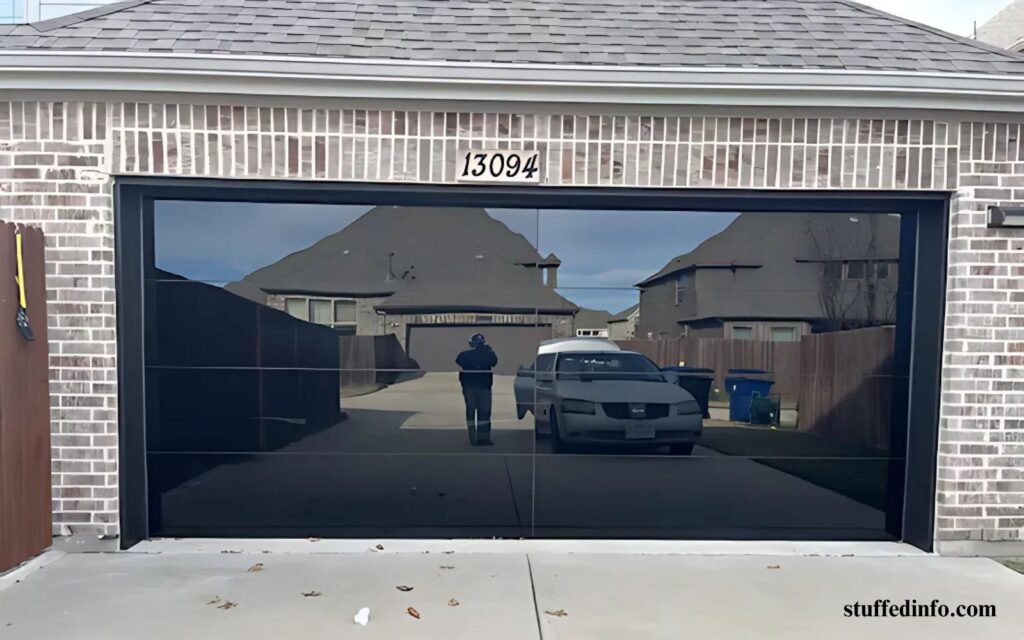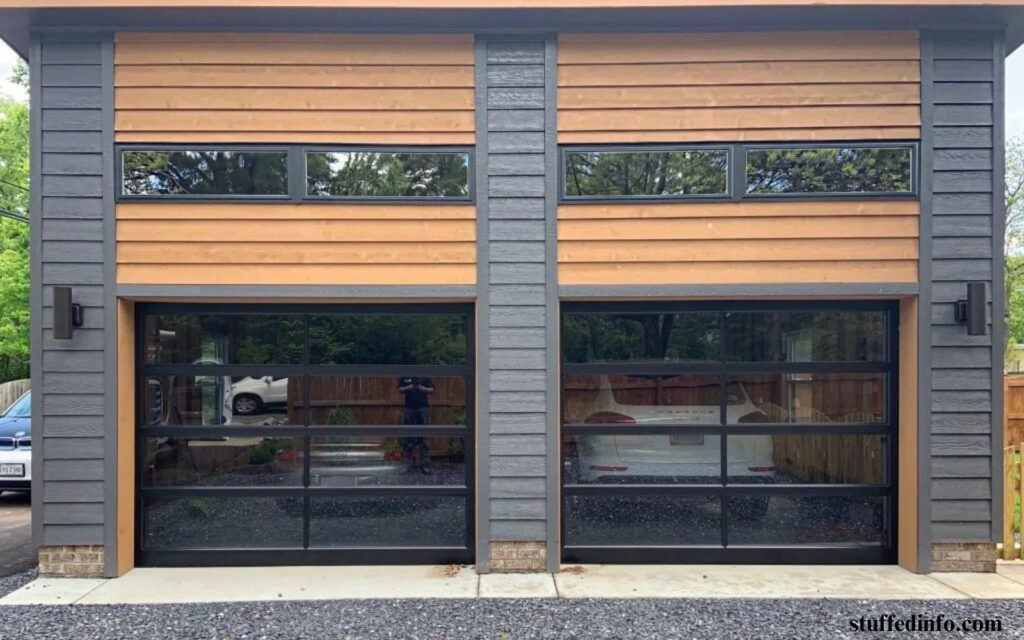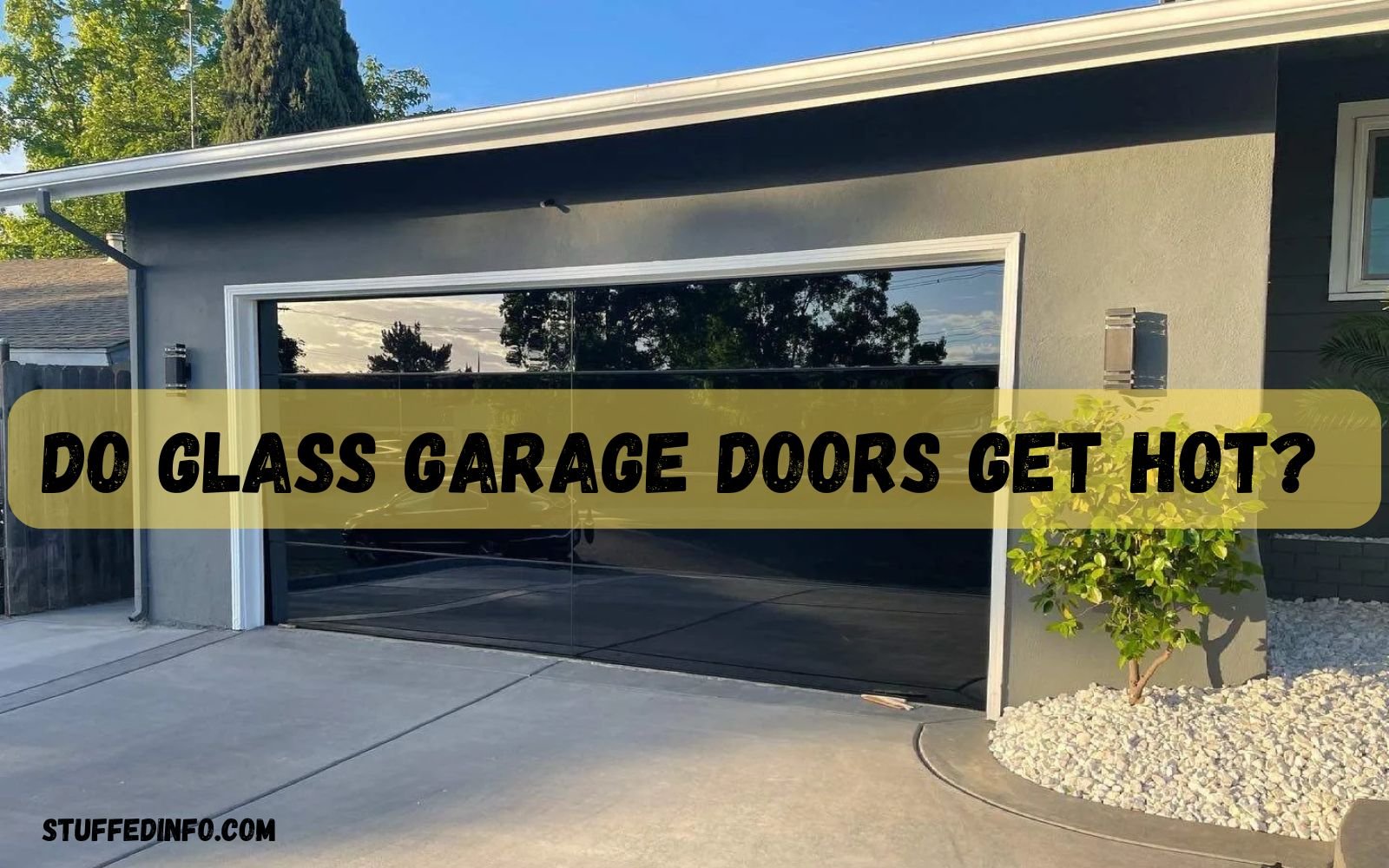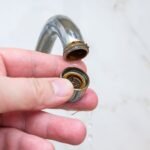Glass doors are a stunning addition to your garage, offering a sleek and modern aesthetic look. However, have you ever imagined that these doors can have a downside too? Well, indeed, glass doors can surprisingly get very hot in some conditions. So, it’s totally normal to question how it handles the sun and warmth. In this blog, we’ll dive into whether glass garage doors get hot or not, how much hot they can really get and the effects of hot glass doors on your vehicle & garage. Additionally, we will share some of the latest technology in these doors that won’t heat up. Moreover, know the effects of glass door temperature on your vehicle. Let’s begin.
Table of Contents
ToggleCan Glass Garage Doors Get Hot?
Yes, glass garage doors can become very hot, especially if they have been exposed to direct sunlight for a long time. Contributing factors to this include the type of glass used, lack of insulation, dark colors, poor ventilation, and high ambient temperatures.
How Hot Can Your Garage Glass Door Get?
Well, how hot your garage glass door can get depends on the type of glass used. Here’s the scoop you need:

- Annealed Glass: This is your standard glass. It can heat up to around 250°C (482°F), but once it gets hotter than that, it’s at risk of cracking.
- Heat-Strengthened Glass: Next a step up from annealed glass is heat-strengthened glass. Now, this one can handle up to 350°C (662°F). Still, if it goes beyond that, it’s likely to fail.
- Tempered Glass: Similar to annealed glass, it can take heat up to 250°C (482°F). Then what’s the difference? When it does break, it shatters into small, less dangerous pieces.
- Ceramic Glass: This is the heavy-duty option. It can handle extreme temperatures up to 1000°C (1832°F) without breaking. Therefore, they are perfect for high-heat situations.
Reasons Behind Glass Garage Doors Getting Hot
There are a bunch of things that make your garage glass door hot. Let’s dive into the main ones:
- Direct Sunlight: The biggest deal with heat is how much direct sunlight the door soaks up. If your door is exposed to direct sunlight for longer periods of time, it absorbs a lot of sunlight, which makes the door super hot.
- Ambient Temperature: This is all about the surrounding air temperature. Naturally, when it’s hotter on the outside, the door’s temperature increases a lot.
- Type of Glass: Next, tinted or frosted glass can help reduce the heat that gets absorbed compared to a clear glass door. Therefore, if your garage door is made of tinted or frosted gladd it does not get too hot. On the contrary, a plain glass garage door gets heated up to soon.
- Insulation: Glass doors that are insulated, like double or triple-pane styles, are great at blocking heat and keeping the temperature steady. Also, they themselves do not heat up too much.
- Color and Surface Finish: Darker colors and some finishes soak up more heat, while lighter or shiny finishes help bounce the heat away. Thus, garage glass doors get hot if they are dark in color.
- Airflow and Ventilation: Bad ventilation around the garage can trap heat, making the door way hotter. But good airflow can help cool things off more efficiently.
- Humidity: High humidity can make the air feel warmer, which can add to the heat around the door indirectly.
By keeping these things in mind, you can get a better grip on dealing with the heat issues that come with glass doors in your garage.
Solutions For Hot Glass Garage Doors
Keeping your glass garage door temperature under control isn’t really that hard. With a couple of clever hacks, you can take on the heat and keep your garage chill, even on the hottest days. So, let’s check out some simple, effective tricks to prevent garage door overheating:

- Start with Tinted or Reflective Film: First off, adding a tinted or reflective film to your garage door’s glass is an easy way to block heat and glare. It not only keeps the glass door and inside cooler but also protects your belongings from harmful UV rays—win-win!
- Upgrade to Insulated Glass for Better Results: If you’re ready for an upgrade, consider switching to insulated glass, like double or triple-pane. It’s excellent for maintaining stable temperatures and cutting down energy costs.
- Don’t Forget About Outdoor Shading : Another simple solution is to install shades, awnings, or even a pergola outside your garage door. This can drastically reduce how much direct sunlight hits the door, making it naturally cooler.
- Improve Airflow to Keep Temperature Down: Good ventilation is the key. By adding fans or vents, you can keep air circulating and prevent heat from getting trapped and the chances of garage glass doors getting hot will be far less.
- Use Reflective Paint or Coatings as a Smart Fix: Another great option to prevent heating of glass is to apply reflective paint or coatings to your garage door. It reduces how much heat the surface absorbs, thus making a noticeable difference.
- Leverage Landscaping for Natural Shade: If you prefer a natural approach, plant trees or tall shrubs around your garage. It not only prevents garage glass doors from getting hot but also enhances your home’s appeal.
In conclusion, preventing the glass garage door from getting hot is a totally doable thing. By combining a few of these ideas, you’ll have a more comfortable garage in no time.
How Does Climate Affect Garage Glass Door Temperature?
The weather in your area has a major impact on how much heat your glass doors soak up.
- Hot Summer Weather: This means you’re more likely to deal with high temps because of those long days and bright sunshine.
Tip: Go for low-E or heat-resistant glass doors to keep the heat from piling up. Tinted glass and shading options can help too.
- Chilly Winter Weather: Glass doors can get super cold, which isn’t usually an issue unless you’re worried about how warm it is inside.
Solution: Insulated glass doors are still a smart choice to keep warmth in during the colder months and save on energy all year long.
Effects of Hot Glass Door on Vehicles & Garage
If you have a glass garage door, you’ve probably noticed how the heat can really mess with your car and the garage itself. Let’s chat about what’s happening and how to fix it.
How Does it Affect the Vehicle?
- Your Vehicle Feels Like an Oven: Ever jumped into your vehicle after it’s been baking in a hot garage? The heat from that glass door can make the inside feel unbearable and even mess with your vehicle’s electronics. Not exactly the best, right?
- Battery Issues: Did you know heat can zap your vehicle battery quicker? It speeds up chemical reactions inside, which means you might have to replace it sooner than you’d like—especially if your vehicle isn’t brand new.
- Tire Pressure Problems: Heat causes the air in your tires to expand, which can leave them overinflated. That’s not good for handling or fuel efficiency.
What Does It Do to Your Garage?
- Rising Energy Bills: A hot garage acts like a heat sink, warming up nearby rooms as well as the garage itself. Thus it becomes harder to cool down. If you’re using AC, you’ll probably see your energy costs going up.
- Uncomfortable Inside: Let’s be real—a scorching garage isn’t pleasant. Whether you’re working on something or just picking up stuff, the heat can make the space pretty unbearable.
- Harm to Stored Items: Got paints, chemicals, or electronics in your garage? Heat isn’t their friend. Being exposed too long can ruin sensitive items or cause them to wear out faster.
- Wear and Tear: Over time, high temperatures can take a toll on your garage door and frame. You might notice cracks or other damage as the materials weaken from all that heat.
Wrapping Up
To wrap things up, even though glass garage doors can soak up and hold onto heat, there are tons of ways to keep that heat in check. By choosing the right kind of glass, going for insulated doors, and using newer technology solutions, you can have a garage that doesn’t get hot but also looks good. Whether you’re in a super hot area or just want to keep your garage chill during the summer, there are loads of tricks to control the temperature and enjoy the nice vibe of garage glass doors without getting too toasty.
FAQ
1. Do glass garage doors require special maintenance due to heat?
Regular cleaning and inspection are essential. Ensure seals remain intact to prevent air leaks that could lead to increased heat inside.
2. Is it safe to park a car in a garage with hot glass doors?
Generally, yes. However, prolonged exposure to extreme heat can affect some car materials. It’s advisable to monitor the garage temperature.
3. What should I consider before installing glass garage doors to avoid heat problems?
Consider the local climate, the orientation of the garage, glass type, color, insulation options, and potential shading solutions to mitigate heat issues.







